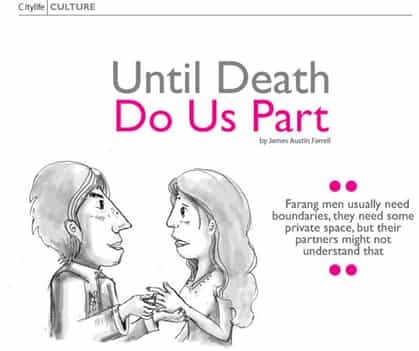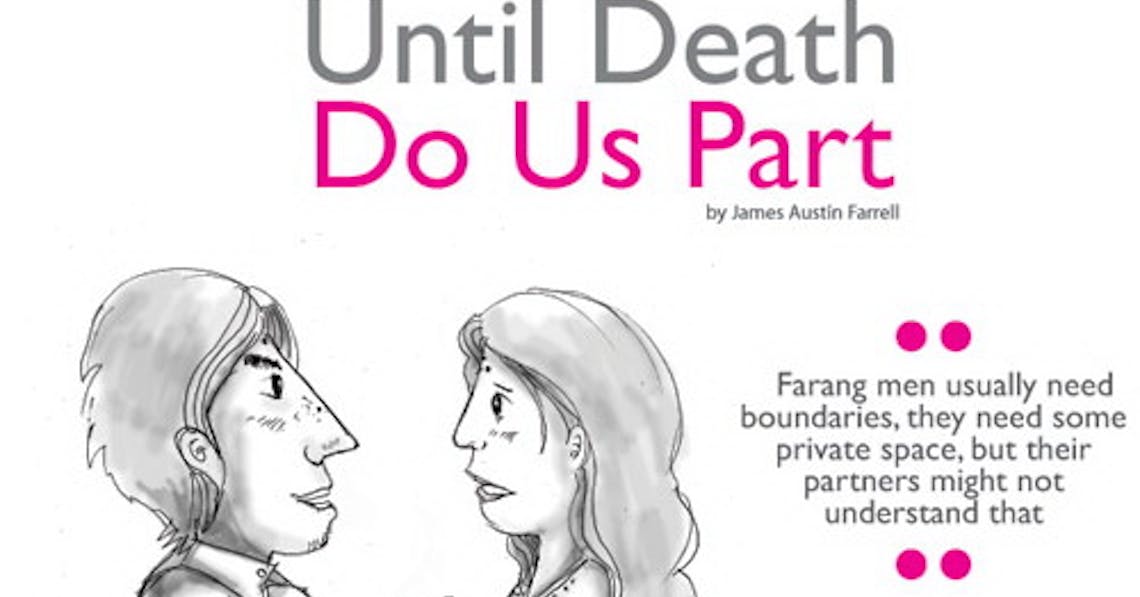
Statistics point out that in many countries divorce rates have been rising and keep on rising. The rate of people getting married has also been in steady decline according to various reports. The US Census Bureau writes that the amount of people getting married has reduced to such an extent that soon the amount of unmarried women, of eligible age, will outnumber married women. Thailand is no different according to Siam Legal, Divorce Attorneys: “During 2003 the divorce rate was 1.28 per 1,000 couples up from 0.97 couples per 1,000 in 1994. This is also reflected in the amount of marriages registered in Thailand over the same period. In 2004 the ration of new marriage in Thailand had been 5 in every 1,000 people compared to 8 for every 1,000 people in 1994.”
What about bi-cultural relationships in Thailand, how do they fare against the tide of conjugal disenchantment? It’s well known that the east and west fusion is a difficult one and that any relationship will surely be embattled by frequent misunderstandings. Interestingly, in 2007, an article in The Nation reported that Thai/farang divorce rates in Isaan were skyrocketing, stating that the Khon Kaen Civil Court revealed that in a period of three months it had dealt with 142 divorce cases, all of them Thai women wanting rid of their expat husbands. The court judge had told the press that the women had apparently become “disillusioned” with their marriages. It was not reported why they became so. So just how difficult is it to make the Thai/foreign relationship work, to remain reasonably content, and to stay until death actually does do you part?
The Counsellors Part I
Dr. Kittiwan Thiamkaew, a psychiatrist at Suan Prung hospital has had varied experience as a counsellor with Thai/farang couples. “They usually wait until the problem gets bigger and bigger, but often they don’t want to separate so they come here,” says the doctor. Understandably, many problems she says are communication problems, the difference in cultures and different personalities. “If they can’t communicate how can they talk about their feelings?” she asks, adding that, “sometimes there are mental problems too, these can be more extreme cases. Some men can become aggressive, violent.” One man she knew burned down his house recently, leaving his wife without a place to live. The man was later admitted to the hospital.
“Some men meet a young girl in a bar. These women are not educated and usually come from poor families; they struggle in life and often have many underlying mental health problems.” She explained also that many of these young women even though often well paid by their husbands are not content in their housewife role at such a young age. “They want to go out, have fun, to behave like a youngster and the men don’t like this,” says the doctor.
She adds that it is these women’s priority to “want money and get support” and this might be the only reason they are with the men. “Sometimes they don’t get enough money and they tell me that.” She explained that if she thinks the girl is trying to cheat him or take advantage of him she will advise him accordingly.
She also mentioned how most western educational standards and rural Thai educational standards are hardly comparable. “Many Thai girls don’t have an education. They can’t express their own feelings, they just suppress everything. They have no concept of psychology.” Though, she added, in a positive light, that this suppression of feelings also works for the man in some ways as the woman is often not confrontational and more tolerant towards his negative traits. “Also, many foreign men want a passive woman; they want a more traditional woman, that’s why they like these Thai women.”
She says that relationships can become belaboured because of trust issues. The man may have a suspicion she wants to cheat him out of his money – which, the doctor admits, does often happen, but she also maintains that the fear is sometimes irrational. If communication were better then issues such as this may not exist.
“There are many educated Thai women who would like to have a foreign boyfriend and not just for his money. You don’t find these girls in bars and more often than not they don’t jump straight into bed with you.” Although she expresses that meeting these women can be difficult because the men generally don’t go to the places where these women go.

The Counsellors Part II
Dr. Suttipan Takkapaijit, Chiang Mai Ram I’s only psychiatrist echoes some of his colleague’s points explaining that he regularly has mixed race couples coming to him for counselling.
He says he acts only as an intermediary and cannot fix people’s relationships, only help them to fix it. “I am a mirror, not a judge, I sit in the heart of the patient and try to understand them,” the doctor explains. “If the men are flexible, if they can adjust, then there can be success,” he says, though does admit that sometimes it is hopeless and two people may have acted out of haste in getting married. In his experience women under twenty-five with much older men is often a recipe for disaster, although he does believe an age gap is not a problem if she has matured enough and perhaps earns her own living.
Many girls that come to see him that are married to foreign men are suffering from depression as a result of their marriage. The reason he explains is not always the age gap or personality differences but the fact that many foreign men in Chiang Mai have mental health issues themselves, many of them having run away from their own country to live here. “They think here everything will be better,” says the doctor, adding that “many retirees here are alcoholics; some are depressed, aggressive or bi-polar. Living here their pension goes a long way and with cheap alcohol abundant some men develop – or experience a resurgence of – psychological problems. This weighs heavily on the Thai partners.
Discussing the relationship between the ‘working’ girl and her ‘farang’ man he also states there are a lot of problems that arise, saying “if they work in the bar too long then they gain a character from that bar.” He understands the difficulties and hardships of poverty and the necessity to take care of your family though he seemed quite adamant that a “tough girl” from the country whose body is a commodity might not be the right match for an older western man. “They all perceive the foreign man as rich and they expect him to support their family. Sometimes he doesn’t understand this and it causes problems.” The doctor explained that these working girls never go for the treatment on their own accord but are taken by husbands and boyfriends that want to know why their relationship is falling apart. As the problem is often money then either the man compromises or the relationship usually won’t work out.
He explains that all relationships between Thai women and foreign man will have inherent cultural difficulties. “Thais are passive,” he says, “not active. They are very concerned with kreng jai and face, foreigners often don’t understand that.” Many situations of Thais being kreng jai or saving their own face can lead to a lot of tension in relationships, he explains, saying this can frustrate the foreigner.
He also believes that Thai people find it difficult to express their feelings and often suppress their true feelings, explaining that a reason for this, again, is “losing face”. He says generally Thai people don’t want to be wrong or look bad and so cannot accept they might have a problem. “They don’t want to be blamed or to perceive that you blame them,” he says, adding, “emotional expression between Asians and Europeans/Americans is so much different, and not just in Thailand but other Asian countries.” Possibly a consequence of upbringing, he hypothesises, pointing out that foreign children are usually brought up to express their emotions whereas Thais are brought up not being expected to express themselves and so are hardly able to as adults.
“And it’s so hard to remain open, if you bend, you won’t get broken,” lyrics from the song Really Hard, by James.
Anyone with a problem can contact Suan Prung and ask for Dr. Kittiwan or go to her private clinic on Samlant Road. Tel: 053 814 772, 081 950 0674
You can call Chiang Mai Ram and make an appointment with Dr. Suttipan 053 224 861
